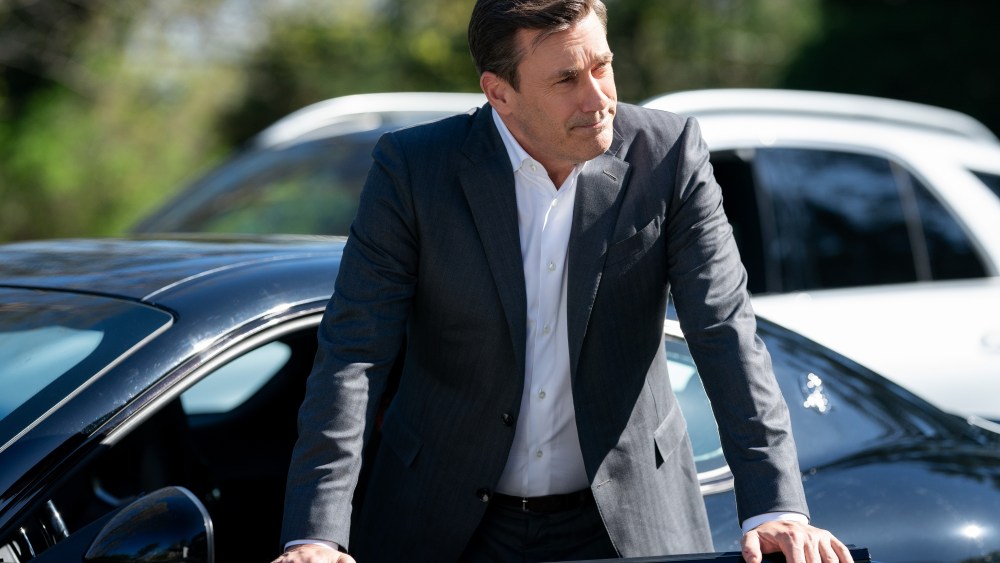Jon Hamm Plays a Millionaire Turned Thief
SPOILER ALERT: This story contains spoilers for the series premiere of “Your Friends & Neighbors,” streaming now on Apple TV+.
“It was at moments like these … when I realized how far you could drift away from your own life, without actually going anywhere.” — Andrew “Coop” Cooper
And therein lies the life lesson of Coop, the uber-wealthy New York hedge fund manager played by Jon Hamm in Apple TV+’s “Your Friends & Neighbors,” which premiered on April 11. At first glance, it’s kinda hard to be sympathetic to Coop after he’s fired from his high-profile job and has only six months of money socked away in which to maintain the lavish lifestyle his family is accustomed to. Boo hoo, right?
The good news is that Coop quickly discovers a way to continue to bring in the big bucks with no one being the wiser to his unfortunate turn of luck. The bad news: That “way” could result in trading his mansion for a 6-by-8 prison cell. If you get caught, grand larceny doesn’t pay well.
“It’s like Robin Hood — almost. Except for one pretty glaring part of it: He doesn’t really give to the poor,” Hamm says of Coop, who finds a hefty profit by stealing high-price items from his super-rich friends and neighbors (thus the show title). “I think there is a relatable aspect to Coop, for sure. Not everybody is worrying about how they’re gonna pay their $300,000 mortgage or fix their $200,000 car. But other than the mathematics of scale, I think those are problems that people have.”
From Coop’s perspective, there are plenty of “assholes” in the neighborhood with mansions “filled with expensive shit” that would never be missed and that no one, including the police, would ever suspect a guy like him as the perp.

Courtesy of Apple TV+
“The lie he’s telling himself is that he needs to feed his family, but there’s ‘feeding your family’ and then there’s ‘keeping your family in their 10,000-square foot home,’” says show creator Jonathan Tropper. “But he’s not prepared to admit defeat, and be shamed in front of this community. He’s not prepared for anyone to know [that he was fired]. He can no longer pay these bills, and he’s not prepared to give up the consumerism and the striving that he’s been raised on. And so it’s gonna be a journey for him to understand that what these robberies really are both, in a sense, keeping up with the Joneses and also lashing out at the system that failed him.”
Coop’s inner monologue is effectively woven into the episodes, in which the troubled character explains what he is doing, why he is doing it and what he really thinks about himself. Almost like what Coop would say to a therapist after years on the couch. Tropper says he wanted Coop to own the series’ point of view, and the voiceovers were the way to make that happen.
“I thought it’s a fun reverse anachronism to have a kind of ’60s noirish voiceover in a very contemporary show,” Tropper says. “What’s really interesting to me — and the reason I think those voiceovers work — is no matter what you’re watching on screen, you’re hearing from the person from a different vantage point. You’re hearing from much calmer, detached person than the person who’s going through it at the moment.”
Tropper adds that using the voiceovers as a device allowed him to “lock in the tone of the show to an extent.” They illustrate the contrast between the self-destructive, risky things we see the character doing on screen, and when he’s reflecting on them later: “Coop is in your ear making a kind of ironic observation about life.”
Hamm thinks of it as Coop stepping back and observing his life from the outside. “In some way, he sort of disassociates from himself, or the version he used to think of himself, maybe that’s establishing another better version of himself. Maybe that’s how we grow. But he’s at least self-aware enough to observe that he is adrift.”

Although his robbing from the rich and, well, keeping it for himself does serve a financial purpose, is there something else behind it that, maybe, Coop enjoys the challenge, the danger?
“I don’t know if I wanna put a name to it, and I don’t think it’s necessarily the danger,” Hamm says. “I think it’s more of the absurdity of the amount of wealth that is accrued in this community that gives him some bizarre pleasure to relieve people of some of that.”
Tropper interjects: “It’s very easy to get lost in the trappings of the sexy plot device of the show, which is a hedge fund manager robbing houses. But to me what this show is really about is about a family. It’s about the dissolution of a family, and it’s about a man who hasn’t come to terms with the grief of the dissolution of his family.
“Before he got fired [from his job], he got fired from his marriage — he lost his wife,” Tropper continues. “And it still hasn’t occurred to him that that happened because he took his eye off the ball. He was focusing on the wrong things. And to me, the real danger in acquiring wealth is there’s nothing evil about wealth, per se: The danger is the amount of time and effort you spend acquiring it. It becomes consuming, and you’re putting your energy into that instead of your family and your marriage and things that will actually mean a lot more to you down the road.”
But, as Coop comes to find out, when you take a bite out of the criminal world, it bites you back.


